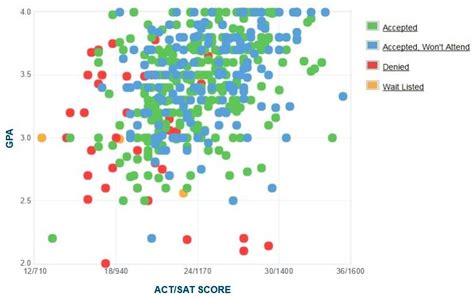Monmouth University, a private research institution in West Long Branch, New Jersey, boasts a rich academic legacy and a diverse student body. Prospective students eager to join the Monmouth community often wonder about their chances of admission. This comprehensive guide delves into the Monmouth University acceptance rate, providing insights for applicants seeking to optimize their applications.

Monmouth University Acceptance Rate: 2022-2023
According to the latest data released by the university, the Monmouth University acceptance rate for the 2022-2023 admissions cycle stood at 79%.
What This Means for Applicants
The acceptance rate indicates that the university accepts approximately four out of every five applicants. While this may appear encouraging, it is crucial to remember that admission decisions are highly competitive and consider various factors beyond just academic performance.
Factors Influencing Admission Decisions
Monmouth University employs a holistic approach to admissions, evaluating each application based on a combination of qualitative and quantitative criteria. These factors include:
- Academic Performance: High school GPA, class rank, and standardized test scores (SAT or ACT) play a significant role in the evaluation process.
- Extracurricular Activities: Involvement in clubs, sports, and community service demonstrates leadership, teamwork, and well-roundedness.
- Letters of Recommendation: Supportive letters from teachers, counselors, or employers provide valuable perspectives on the applicant’s character and abilities.
- Personal Statement: The personal statement allows applicants to showcase their unique qualities, aspirations, and why they are a suitable fit for Monmouth University.
Key Statistics for Admission
To provide further context, here are some key statistics related to Monmouth University’s admissions process:
| Statistic | Value | Source |
|---|---|---|
| Undergraduate Acceptance Rate | 79% | Monmouth University Admissions Office |
| Average GPA of Accepted Students | 3.6 | CollegeData |
| Average SAT Score of Accepted Students | 1170 | CollegeData |
| Average ACT Score of Accepted Students | 25 | CollegeData |
Common Mistakes to Avoid
When applying to Monmouth University, it is important to avoid common pitfalls that could hinder your chances of admission. These include:
- Rushing the Application: Take ample time to gather all the required materials and carefully craft your personal statement.
- Not Proofreading: Ensure that your application is free of grammatical errors and typos, which can create a negative impression.
- Not Researching the University: Demonstrate your genuine interest in Monmouth University by researching its academic programs, campus life, and career resources.
- Failing to Meet Deadlines: Adhere strictly to the submission deadlines to avoid missing out on the application review process.
- Not Seeking Help When Needed: Do not hesitate to contact the admissions office or your high school counselor if you have any questions or concerns about the application process.
Pros and Cons of Monmouth University
Before submitting your application, carefully weigh the pros and cons of attending Monmouth University to determine if it is the right fit for you.
Pros:
- Strong Academics: Monmouth University offers a wide range of undergraduate and graduate programs, many of which are highly ranked nationally.
- Dedicated Faculty: The university’s faculty is composed of experienced and accomplished scholars who are committed to student success.
- Diverse Student Body: The campus is home to students from all over the world, creating a vibrant and inclusive learning environment.
- Numerous Extracurricular Activities: Students can choose from over 100 student clubs and organizations, allowing them to explore their interests and build a sense of community.
- Beautiful Campus: The university’s 170-acre campus provides a picturesque setting for academic pursuits and student life.
Cons:
- High Tuition: Monmouth University’s tuition is higher than the average cost of private colleges in New Jersey.
- Off-Campus Housing: Most upperclassmen live off-campus, requiring additional expenses for housing and transportation.
- Limited On-Campus Parking: Parking can be a challenge, especially during peak hours.
- Commuting to Campus: For students living off-campus, commuting to and from the university may add significant time to their daily schedules.
- Lack of Football Team: The university does not have a football team, which may disappoint sports enthusiasts.
Frequently Asked Questions (FAQs)
- What is the deadline to submit my application? The university has rolling admissions, so applications are reviewed as they are received. However, it is recommended to apply by January 15th for priority consideration.
- What are the application requirements? You will need to submit your official high school transcript, SAT or ACT scores, letters of recommendation, and a personal statement.
- What are the chances of getting into Monmouth University? The acceptance rate for the 2022-2023 admissions cycle was 79%.
- What is the average GPA of accepted students? The average GPA of students accepted into Monmouth University is 3.6.
- How competitive is the admissions process? The admissions process is competitive, and the university considers a holistic range of factors.
- What can I do to increase my chances of admission? Focus on earning a strong GPA, participating in extracurricular activities, and writing a compelling personal statement that highlights your unique qualities.
- How do I contact the admissions office? You can contact the admissions office by phone at (732) 571-3400 or by email at [email protected].
- Where can I find more information about Monmouth University? Visit the university’s official website at www.monmouth.edu.
Conclusion
The Monmouth University acceptance rate serves as an essential indicator of the university’s selectivity. While it provides a general sense of the competition, it is crucial to approach the admissions process strategically by meeting application deadlines, submitting all required materials, and showcasing your unique qualities. By carefully considering the factors that influence admission decisions, researching the university, and avoiding common pitfalls, prospective students can increase their chances of joining the Monmouth University community.
